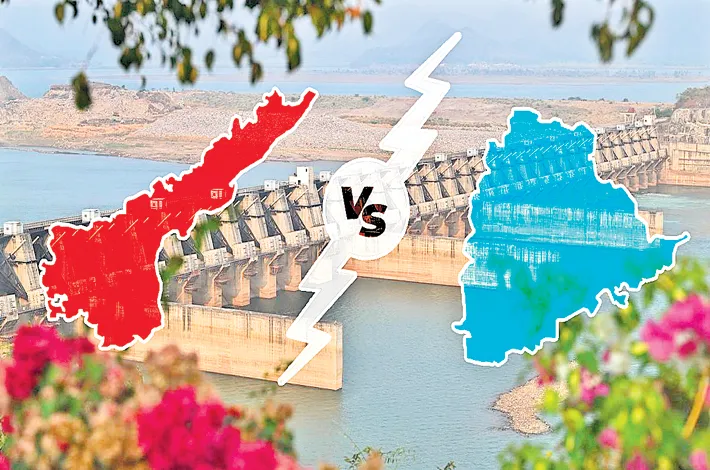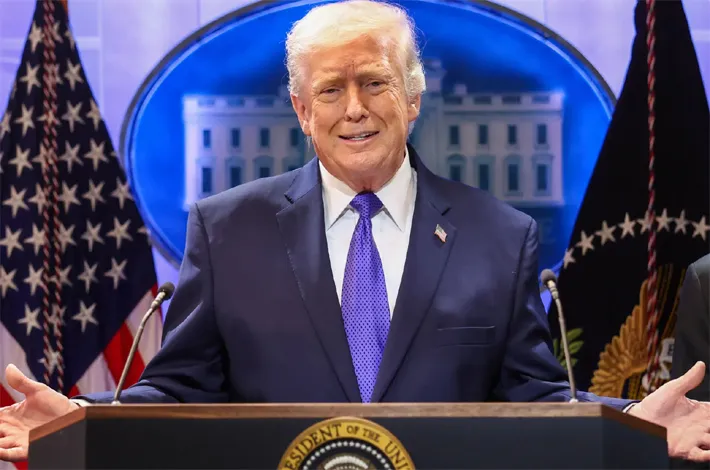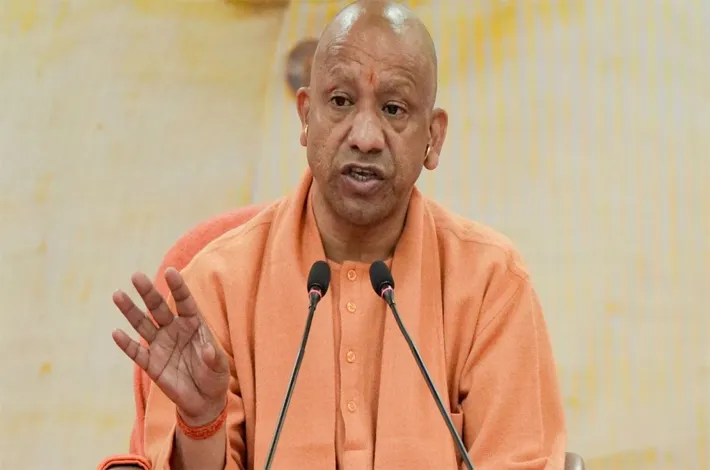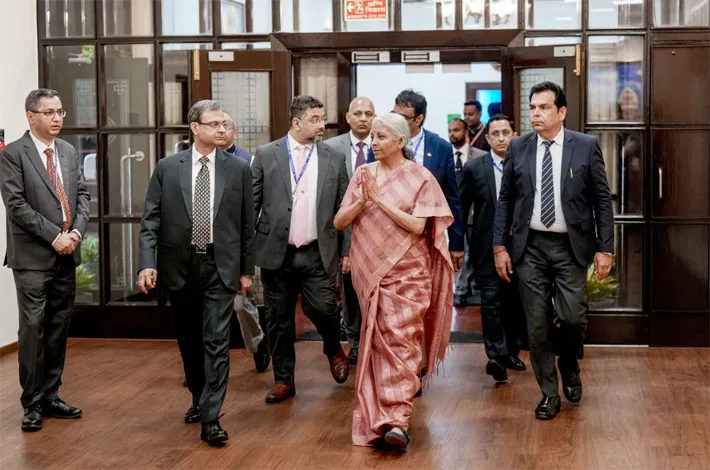Water war leads to political manoeuvring…
04-07-2025 12:00:00 AM

metro india news I hyderabad
The Banakacharla project, a proposed river-linking initiative to divert surplus Godavari River water to drought-prone regions of Andhra Pradesh, has ignited a fierce controversy between Andhra Pradesh (AP) and Telangana, with political undercurrents shaping the narrative. Andhra Pradesh Chief Minister N. Chandrababu Naidu, leader of the Telugu Desam Party (TDP) and a key figure in the National Democratic Alliance (NDA), has been at the forefront of defending the project, emphasizing its potential for mutual benefits while dismissing claims of harm to Telangana.
On Thursday, during a public meeting in Kuppam, Naidu reiterated that the project would utilize only 200 TMC (thousand million cubic feet) of the 2,000 TMC of Godavari water that annually flows unused into the Bay of Bengal, ensuring no adverse impact on Telangana’s water rights. This stance, however, has not quelled the political firestorm, as opposition parties in Telangana, particularly the Bharat Rashtra Samithi (BRS) and Congress, have accused Naidu of prioritizing AP’s interests, potentially at Telangana’s expense.
The controversy also signals a broader political strategy, with speculations that the NDA—comprising TDP, Bharatiya Janata Party (BJP), and Jana Sena Party (JSP)—may leverage the issue to make inroads into Telangana’s political landscape, particularly in the upcoming Greater Hyderabad Municipal Corporation (GHMC) polls and the 2028 Telangana Assembly elections.
All for water security
The Polavaram-Banakacherla Link Project (PBLP), estimated at ₹81,900 crore, aims to divert Godavari floodwaters through the Nagarjuna Sagar Right Bank Canal and a 31-km tunnel to a new reservoir at Bollapalli in Guntur district, with a capacity of 150 TMC. The water would then be channeled to Banakacherla in Nandyal district to irrigate 240,604 hectares across eight districts, including the arid Rayalaseema region, Prakasam, and Nellore.
Naidu has consistently argued that the project targets surplus floodwater, not Telangana’s allocated share of 968 TMC under the Godavari Water Disputes Tribunal Award of 1980. “I have never opposed, nor will I oppose, any irrigation projects being taken up by Telangana on Godavari rivers,” Naidu stated in Kuppam, emphasizing a cooperative approach. He further highlighted that the project could benefit both states by harnessing water that would otherwise be lost to the sea, potentially irrigating parched lands and boosting agricultural productivity.
However, Telangana has raised significant objections, citing potential violations of the 1980 tribunal award and the risk to its own irrigation projects, such as Kaleshwaram. The state’s concerns were validated when the Union Ministry of Environment, Forest and Climate Change’s Expert Appraisal Committee (EAC) returned AP’s project proposal on June 17 urging a reassessment of floodwater availability in consultation with the Central Water Commission (CWC). Environmentalist Bayyapu Reddy has also criticized the project as “irrational and environmentally destructive,” warning of cost escalations—potentially reaching ₹8 lakh crore—and geological risks to the Bollapalli reservoir. Telangana’s Irrigation Minister N. Uttam Kumar Reddy has vowed to protect the state’s water rights, even threatening legal action in the Supreme Court if necessary.
Accusations and counterclaims
The project has become a political flashpoint, with Telangana’s ruling Congress and opposition BRS accusing Naidu of undermining their state’s interests. Telangana Chief Minister A. Revanth Reddy has alleged a “secret deal” between Naidu and himself, a claim echoed by BRS leader T. Harish Rao, who accused Reddy of silently supporting AP’s agenda.
Reddy countered by pointing to a 2016 Apex Council meeting where former Telangana CM K. Chandrashekar Rao (KCR) reportedly offered Godavari water to AP, a charge the BRS denies, labeling it a distortion of facts. Congress MP Chamala Kiran Kumar Reddy credited his party for halting the project’s environmental clearances, while BRS leaders claimed their agitation forced the Congress to act. The BJP, an NDA ally, has been accused by Revanth Reddy of favoring AP due to Naidu’s influence at the Centre, further complicating the narrative.
Naidu’s balanced rhetoric, invoking mutual benefits for both Telugu states, harks back to his pre-bifurcation “two eyes” theory, which emphasized equal development for Andhra and Telangana. This approach may be a strategic move to diffuse tensions and appeal to Telangana’s electorate, particularly as the NDA eyes a political foothold in the state.
NDA’s Political ambitions in Telangana
The Banakacharla controversy coincides with speculations that the NDA alliance—comprising TDP, BJP, and JSP—plans to contest the GHMC polls, scheduled for late 2025, as a stepping stone to the 2028 Telangana Assembly elections. Media reports suggest the BJP could contest 50% of the 150 GHMC wards, with TDP and JSP splitting the remainder.
The BJP already holds strongholds in urban areas like Hyderabad, Secunderabad, and parts of Rangareddy, having won eight Lok Sabha seats in Telangana in 2024. The TDP, despite its diminished presence post-2014 bifurcation, retains a grassroots cadre in districts like Khammam and Nalgonda, while JSP chief Pawan Kalyan’s fan base could bolster the alliance’s appeal among younger voters.
The GHMC polls, which govern Hyderabad’s municipal body, are a high-stakes battleground. In 2020, the BJP won 48 wards, trailing the BRS’s 56, while Congress secured only 2. An NDA alliance could challenge the BRS’s dominance and capitalize on Congress’s relatively weaker urban presence. Analysts suggest that a strong GHMC performance could position the NDA as a formidable force against Congress in the 2028 Assembly polls, potentially forcing the BRS to align with either the NDA or Congress to remain relevant.
Broader implications
The Banakacharla project underscores the delicate balance of interstate water disputes and political alliances in India’s federal structure.
Naidu’s insistence on mutual benefits reflects an attempt to navigate these complexities while strengthening the NDA’s regional influence. However, Telangana’s apprehensions, backed by environmental and legal concerns, highlight the challenges of unilateral water projects in shared river basins. The project’s fate hinges on further consultations with the CWC and resolution of interstate issues, with the EAC’s rejection serving as a temporary setback for AP.
As the GHMC polls approach, the NDA’s coordinated strategy could reshape Telangana’s political landscape, leveraging the Banakacharla issue to rally support. Whether Naidu’s vision of shared prosperity prevails or fuels further discord will depend on diplomatic negotiations and the NDA’s ability to translate rhetoric into tangible benefits for both states. For now, the controversy remains a potent mix of policy, politics, and regional aspirations, with far-reaching implications for the Telugu states and the NDA’s ambitions.








